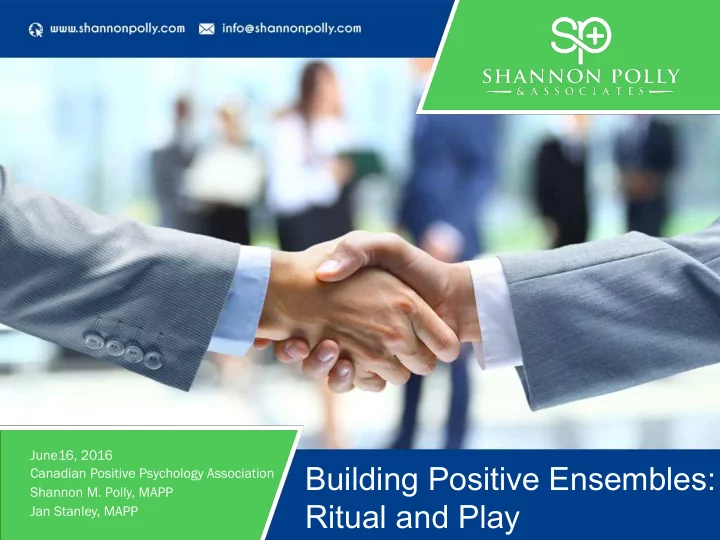

June16, 2016 Building Positive Ensembles: Canadian Positive Psychology Association Shannon M. Polly, MAPP Ritual and Play Jan Stanley, MAPP
Agenda Some RES RESEAR EARCH CH on play Let’s PLA PLAY Y together How to DE DESIGN IGN rituals Let’s create RIT ITUALS together
Agenda Some RES RESEAR EARCH CH on play Let’s PLA PLAY Y together How to DE DESIGN IGN rituals Let’s create RIT ITUALS together
Definition of PLAY Play is a state of being "Play is something done for its own sake. It’s voluntary, it’s pleasurable, it offers a sense of engagement, it takes you out of time. And the act itself is more important than the outcome.”
Process of PLAY 1. Anticipation 2. Surprise 3. Pleasure 4. Understanding 5. Strength 6. Poise
Why does play matter? Play has been found to: Play facilitates Play is a biological learning of It forms necessity emotional control, connections social competency, between strangers personal resiliency and cultivates and continued healing curiosity J. E. Johnson, S. G. Eberle, T. S. Henricks, D. Kuschner (Eds.), The Handbook of the Study of Play (Vol. 2) (477-487).
Lack of play? When it comes to lack of play: Lack of play = social, Researchers studied emotional and murderers and the cognitive narrowing, two consistent things be less able to in their history were handle stress, and abusive families and often experience lack of play as depression children Brown, (2009) Play, New York: Penguin.
How does play work in groups? Humo mor lowers defenses – making your ensemble more open to your message
Why does play build positive ensembles? Researchers have found that: Fredrickson and Branigan (2005). Cognition & Emotion, 19 , 313-332.
Agenda Some RES RESEAR EARCH CH on play Let’s PLA PLAY Y together How to DE DESIGN IGN rituals Let’s create RIT ITUALS together
I MADE A MISTAKE! Exercise 1 2 3 Form a Point to someone circle of Introduce yourself with in the circle and about 8 your new superhero name say their name people 4 5 6 When you pause or Run to the make a mistake, The whole next circle throw your hands up circle and applauds! and say “I made a introduce mistake!” yourself
DEBRIEF
What was is like to make a mistake? mistakes What was the benefit of making mistakes? DEBRIEF How did it feel to be able to play? positive experiences How does this build positive ensembles?
How to Build in Play Experiences Lieberoth, A. (2015). Games and Culture, 10 (3), 229-248.
The Triangle Exercise 1 2 3 In a moment you will Silently move to make an Keep moving until choose two equilateral triangle with you succeed people them.
The Triangle Exercise 1 2 3 In a moment you will Silently move to make an Keep moving until choose two equilateral triangle with you succeed people them. 4 5 How can Now be aware of you help everyone in the room. everyone succeed?
DEBRIEF
Character Strengths Matter: How to Live a Full Life
Agenda Some RES RESEAR EARCH CH on play Let’s PLA PLAY Y together How to DE DESIGN IGN rituals Let’s create RIT ITUALS together
Opening ritual
The rise of modern ritual
The rise of modern ritual Age cohorts who value meaning Distractions Portable work Membership decline
The rise of modern ritual Ritual now Ritual then Sacred spiritual actions And…morning cup of coffee Scholarship of ritual as an element of And…the advent of inter-disciplinary other disciplines ritual studies Mystical And…the psychology of ritual
The Psychology of Ritual Rituals Lessen Grieving Rituals Enhance Gino & Pleasure Norton Vohs, Wang, Gino, Norton
What is a ritual? Scholars agree that a ritual is an ACTION
What is a ritual? “Little certainty in identifying ritual’s center and its boundaries.” Ronald Grimes
What is a ritual? “Little certainty in identifying ritual’s center and its boundaries.” Ronald Grimes Deeply in the bones Elevates the mundane Invites a sacred pause Infuses action with meaning
What is a ritual? Ritual is used to act out or to express beliefs, intentions, desired states. Well b ll being ng? Positive e ens nsemb mble les?
Design a Ritual 2 1 Find applicable research 3 Set your intention Customize to fit 5 your ensemble 4 Evaluate Experiment
Incorporate rituals into team routines
Design one-time team rituals
Agenda Some RES RESEAR EARCH CH on play Let’s PLA PLAY Y together How to DE DESIGN IGN rituals Let’s create RIT ITUALS together
www.shannonpolly.com Created with Haiku Deck
RECAP PLAY – – t the he R Research It’s not just for children DE DESIGN IGN your play experience Mistake! Triangle Rituals ls Artifacts Reading aloud
Questions?
How can you learn more? approach www.shannonpolly.com www.p .positivebusine nessdc.c .com www.g .goodli liferituals ls.c .com Peterson and Seligman, 2004, p 16-28
Jan Stanley, MAPP (608) 215-8028 jan.b.stanley@gmail.com www.GoodLifeRituals.com www.shannonpolly.com
Ensemble Ritual
Recommend
More recommend